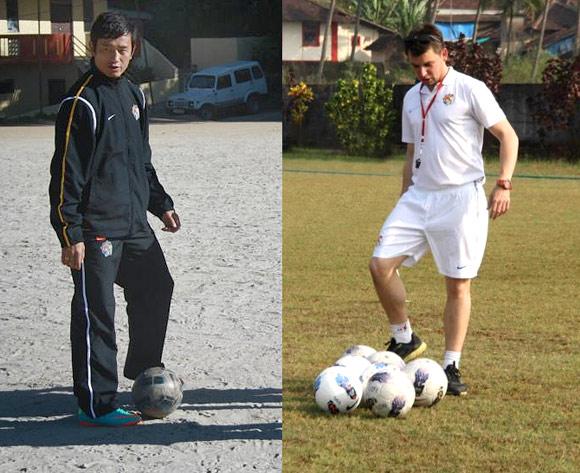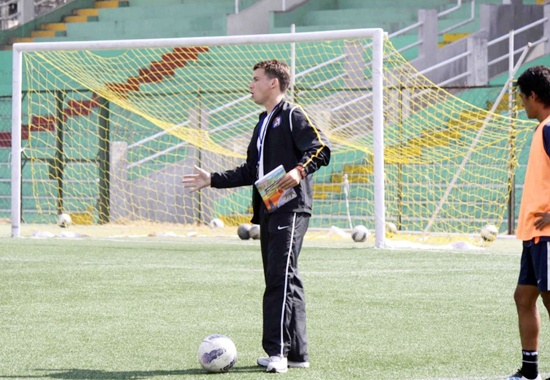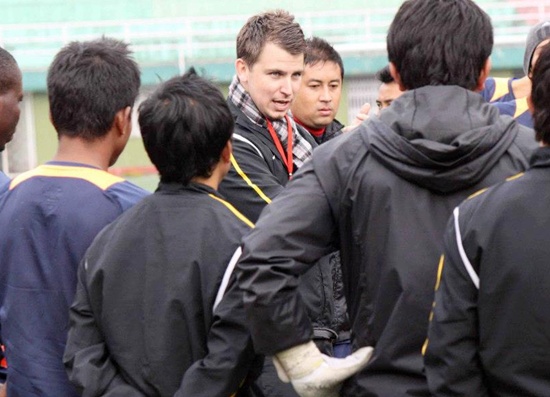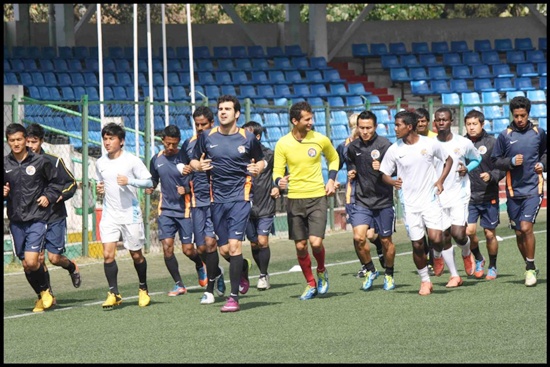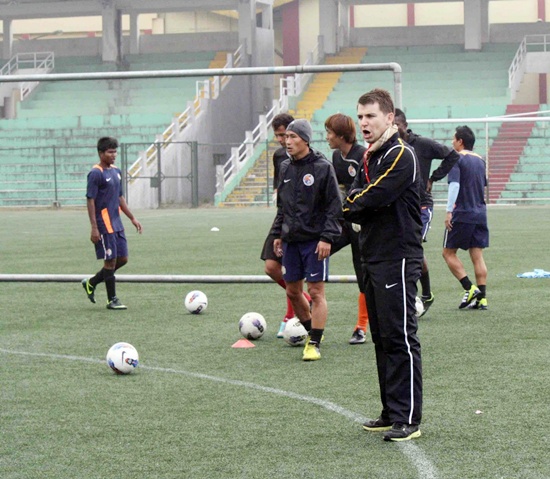 | « Back to article | Print this article |
Bhutia's dream United Sikkim in for the long haul
The Baichung Bhutia co-owned United Sikkim Football club is languishing at the bottom of the I-League table. And faced with a depleting fan following in the small Himalayan state of Sikkim, fear is rife that things might not be hunky dorky.
But the former India captain insists that he and his club are there for the long haul.
After having fulfilled his dream of forming a football club, Bhutia states that fulfilling a dream and living a dream are two different things. He says, "Dreams are different and tournaments are different. We have to keep carrying on the dream. And United Sikkim will remain in the league despite the results as we are here for the long term."
Passion unites and drives Bhutia, Hall
Along with Bhutia is head coach Nathan Hall, who despite a season of narrow loses and dull draws, tries to keep a calm face.
It is not just youth that these two share but also the same passion -- it unites and drives them.
Both are also passionate to keep their club afloat in the I-League. But they have different ways. Bhutia is a silent spectator and majorly deals with managerial section whereas Hall, is where all the action is. And he is robust in his day-to-day business. It is no surprise that he loses his vocal chords when his team loses and it is a tad more frequent these days.
But the two men who matter a lot on and off the field put up a brave face.
And what keep both of them sane is the segregation of their tasks and responsibilities. Both hold mutual respect for each other. Hall finds it easier to function and hails Bhutia as one of the most professional bosses as he does not poke his nose in his business.
On the other hand, Bhutia says, "I am seen less on the pitch because I have a lot to do off it. And I pay the coach a lot of money so he is the better person to decide as to what happens on the field."
Coach looks forward to his team's five home matches
Hall, 27, the youngest professional coach in Asia, is banking on the sleepy town of Gangtok to give his players motivation.
Bruised but not broken, Hall and Bhutia look forward to their team's five home matches.
It is a fact that the numbers of spectators have dropped like the form of the team -- from 20,000 in the initial matches to mere 4-5,000 in the recent matches at the Paljor stadium, Gangtok.
Hall, who had coaching experience in Australia, Thailand and Indonesia, does not believe in negativity and refuses to admit that his team has been inconsistent. He seems to be playing with words when he says, "We are consistently competitive. It is just that we have not been able to win and that is the problem."
Hall's face lights up as he says, "We will be more aggressive at home because the boys will be playing in front of their fans. They spectators can give the players more motivation."
Hall animatedly adds, "When we play at home my philosophy is to play hard. We attack from minute one. There is no room to breathe. There will be no sitting back and waiting for them to attack."
'From the outside it looks we are struggling but we are very strong'
Bhutia hates to admit that their supporters have been thinning and adds, "When you do not perform, it is bound to happen. We do not expect 20,000 people to follow us in the first year itself."
But it is crunch time and Hall's boys need to make the most of the home matches.
The ambitious Hall took a plunge with United Sikkim this year there might have been instances when the young coach probably wanted to take to the field and make a difference.
The gracefulness born out of self confidence on Hall's face does depict that he knew that the road would not be a rosy one. But again Hall does not let out of lot from the closed doors of his team and with Zen-like calmness says, "From the outside it looks we are struggling but we are very strong. My players are happy. I am doing as much as I can to improve. In some matches we have been extremely unlucky."
The Australian elaborates, "When it comes to performance and improvement of my players, we are definitely going in the right direction. Everybody is getting better and better. We are not in the right position on the table but we are playing better football, creating chances and giving experienced teams a run. The only problem is finishing off matches."
'We have not learnt from our mistakes yet'
Hall, who took up coaching at the age of 18, is excited to play a crucial role in a young team but ask him whether the excitement has died down and pat comes the reply, "Me as a coach, people judge me on results. From outside people think things aren't right but considering our budget and experience, we are doing the best we can do. We are just making sure that we learn from our mistakes."
He continues, "Yes, we have not learnt from our mistakes yet but we need to ensure that we are concentrating and staying focused for the full game."
The crux of Hall's problems lies in his team's inability to stick to their lead. He shakes his heads and says, "It is very hard for me to relax them in such situations."
Alas the coach has no magic wand to get rid of their problems.
The coach knows it and stresses, "We have seven games to show our supporters and management that we mean business."
'If we get relegated then it's going to be struggle for us'
When it comes to business, it is a well documented fact the United Sikkim is a baby in the league and surviving on a frugal budget.
Arjun Rai, the senior manager with the club, looks pensive and says, "If we get relegated then it's going to be struggle for us. It is very difficult for a small club to survive."
But he thanks that they have Bhutia who acts as the club's inspiration in their times of trouble.
Thupden Rapgyal, the deputy director of sports, government of Sikkim, echoes the voice of United Sikkim's management as he points out that United Sikkim FC is not just looking at the I-League. He says, "We want to nurture players not only for the national team but also to send them abroad. We want the best boys to play in Europe too."
When Hall learnt mountaineering course level 1, he never thought he would land up in a Himalayan state. Hall has learnt the technique of anchoring himself on the mountains but will he play the catalyst in anchoring his team in the I-League, only time will tell.
In Hall's words, his boys look fitter, strong and more organised.
"The players are a lot hungrier so everything is improving but at the end of the day we need to win. And the difference between winning and drawing in this league is not very much," he says.
All he needs to do is find this difference.
